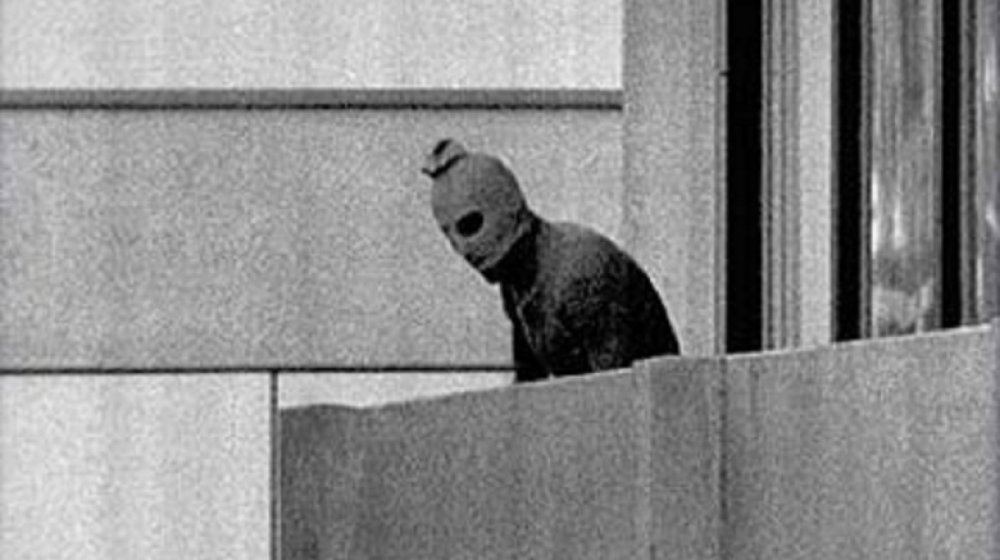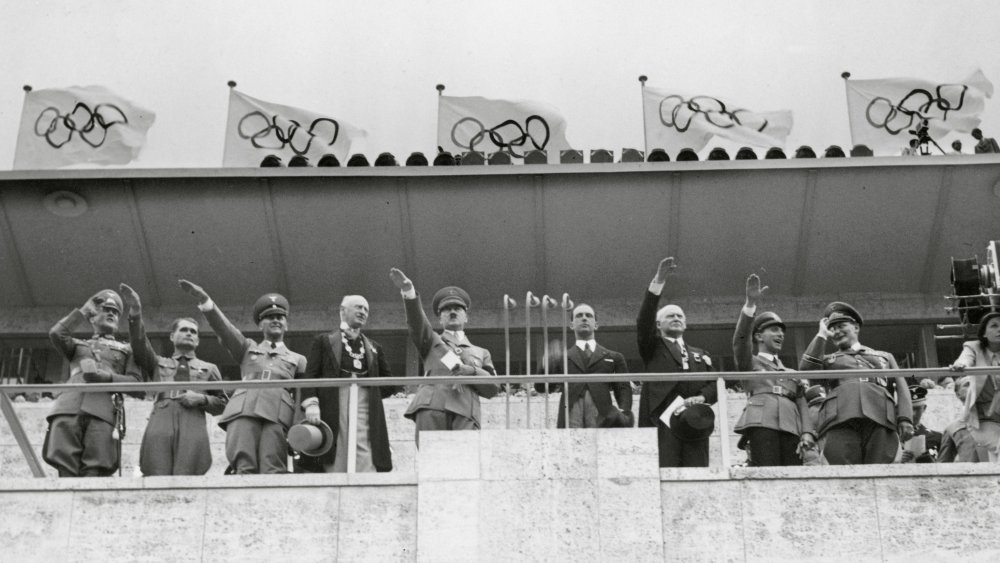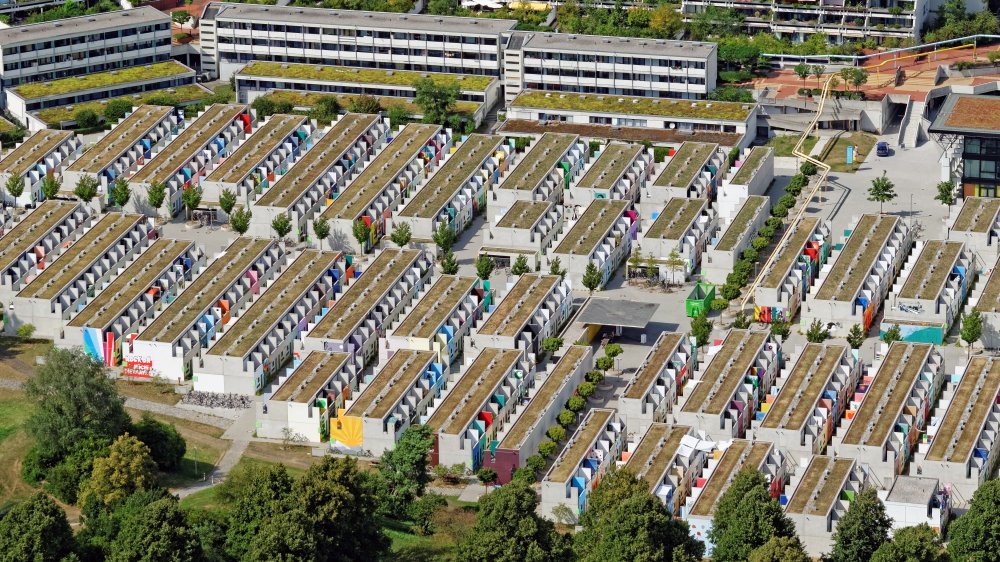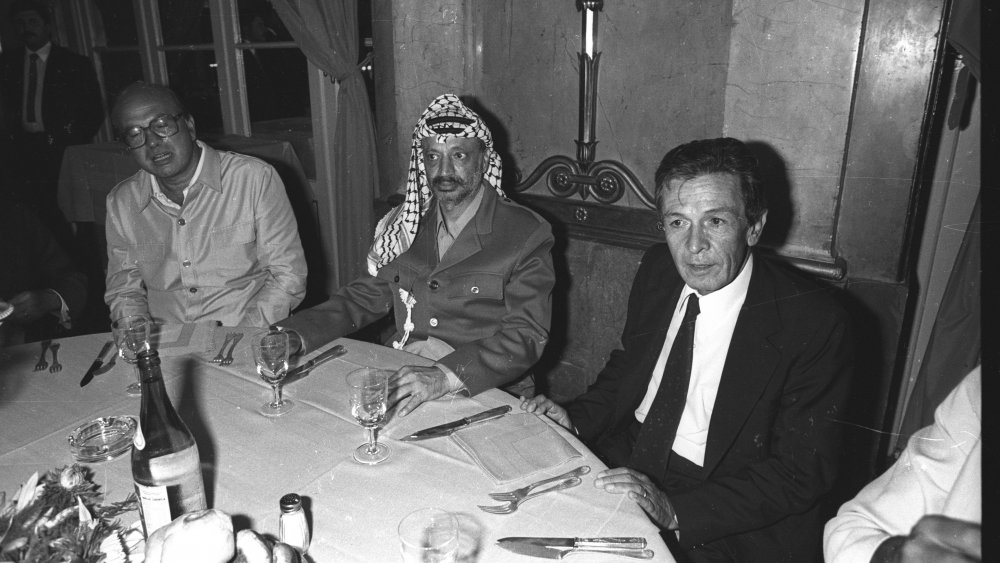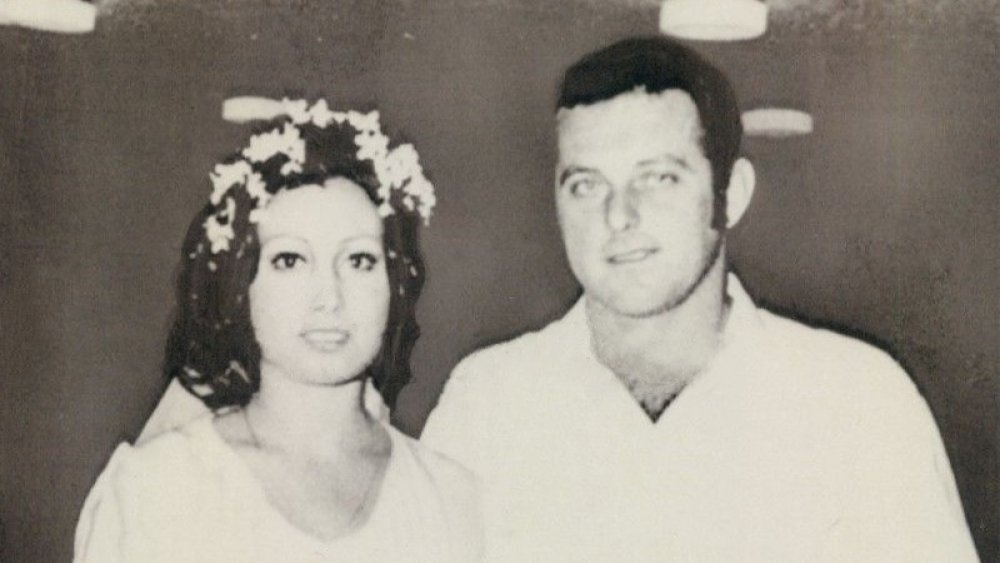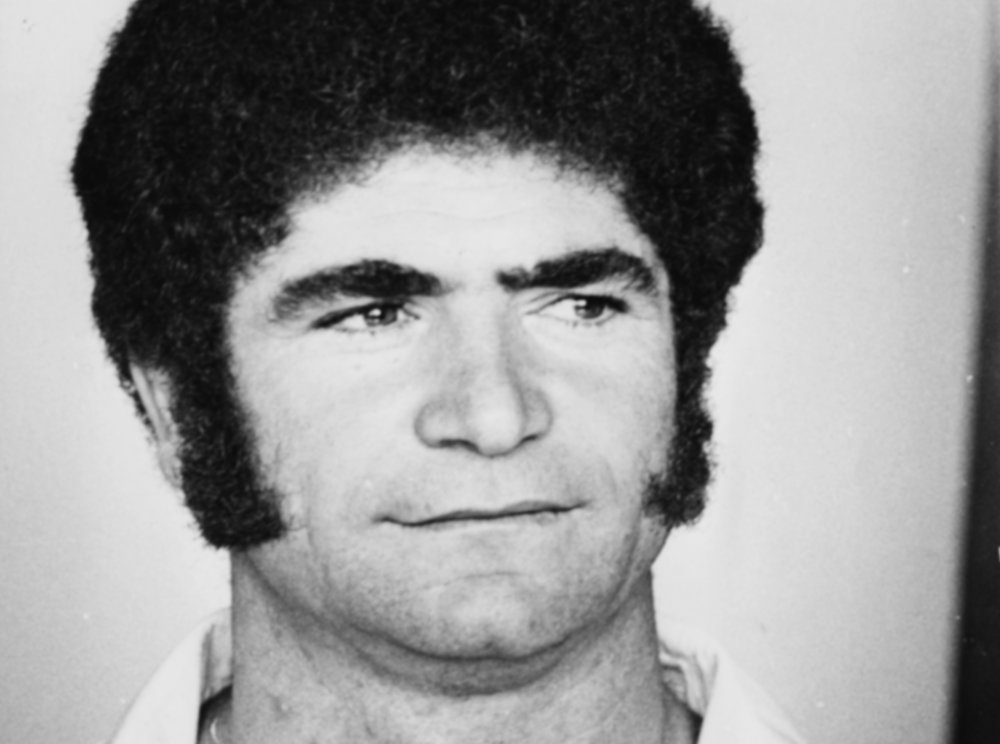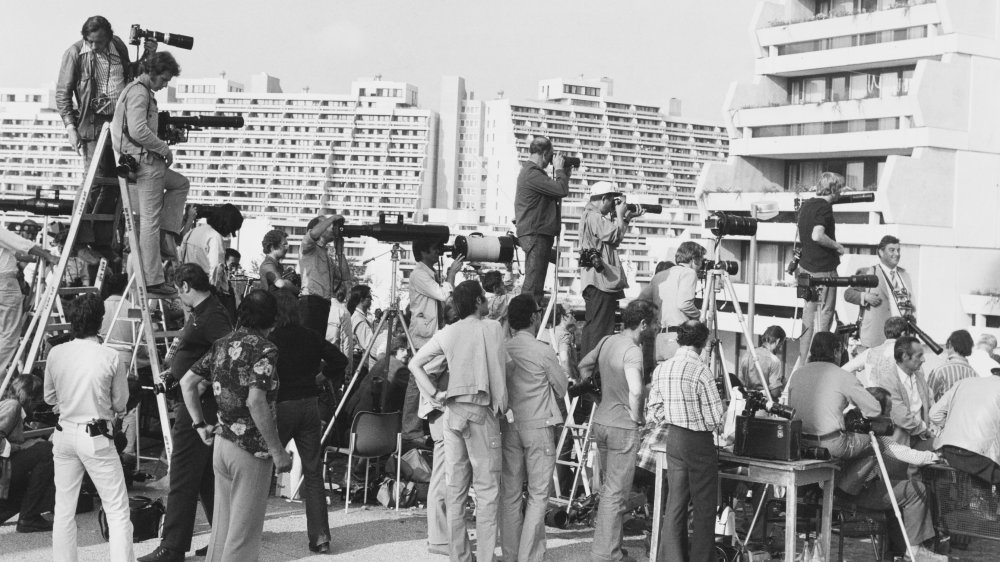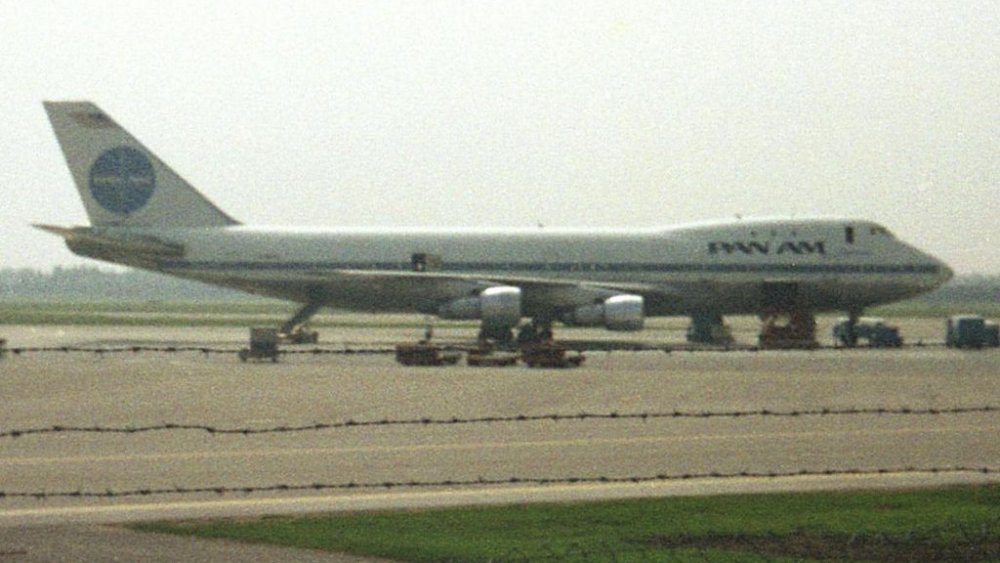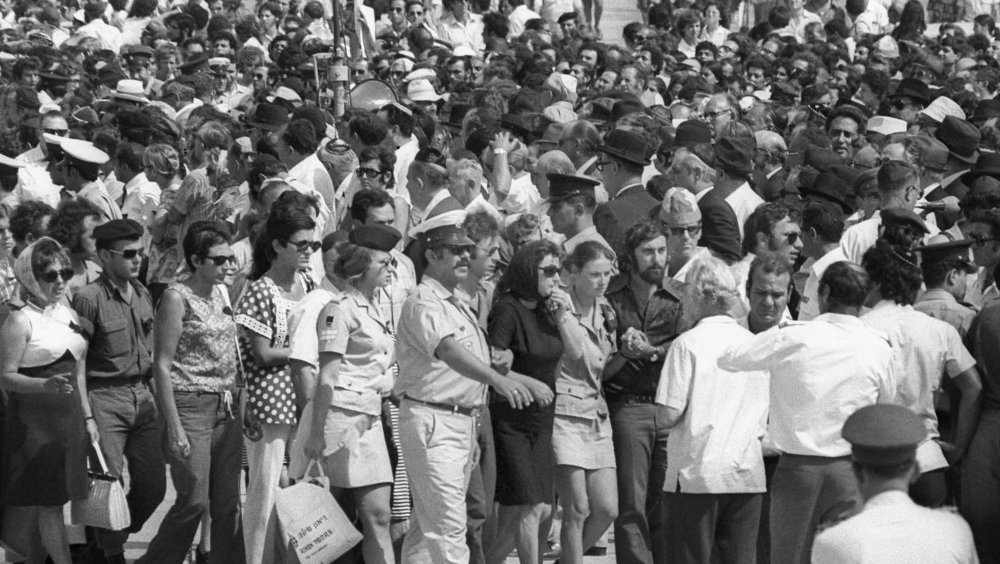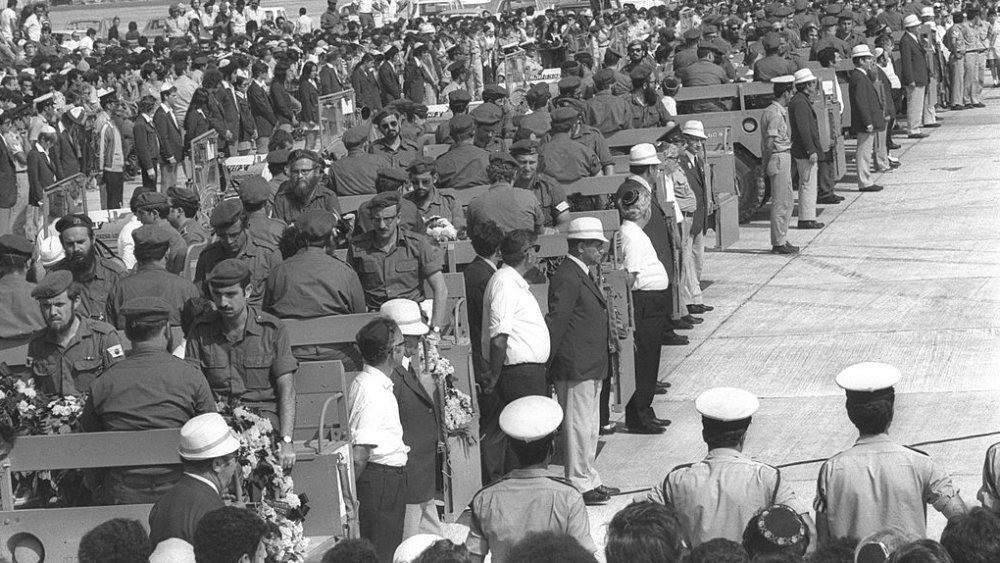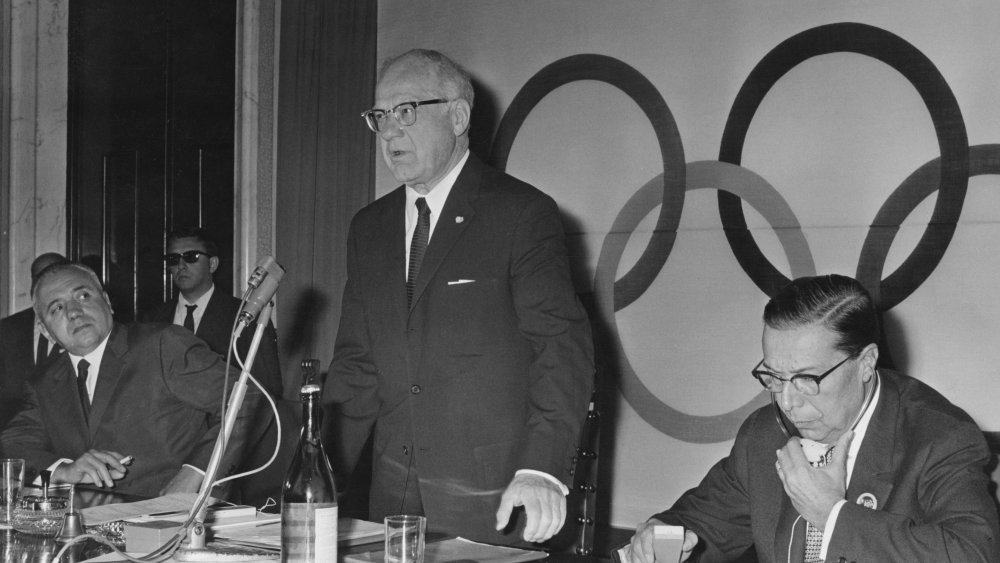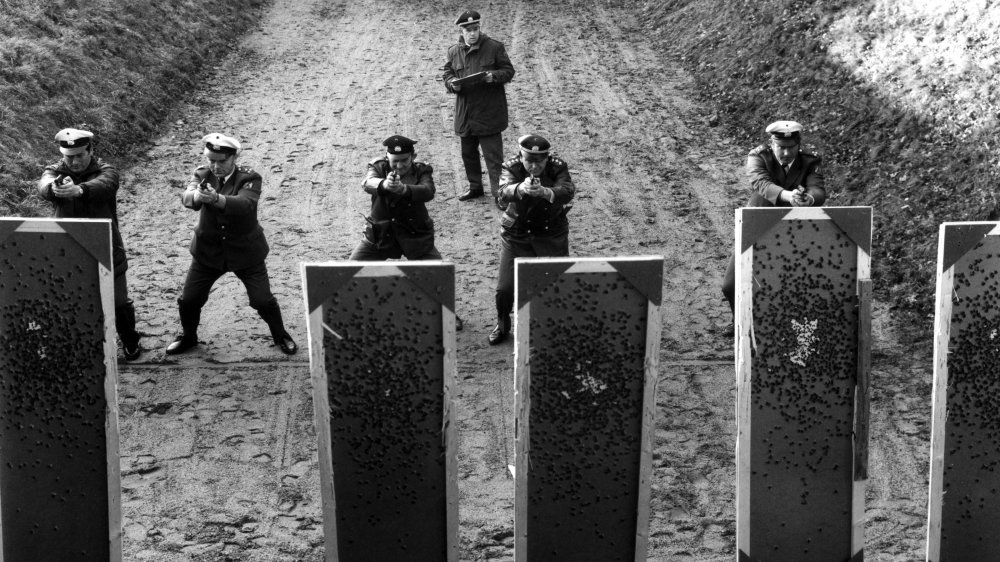The Tragic Real-Life Story Of The Munich Olympics
The 1972 Summer Olympics, hosted in Munich, West Germany, were the largest Olympics to date, and the first to be held in Germany since the 1936 Games under the Nazi regime. They included memorable highlights like U.S. swimmer Mark Spitz winning a record-breaking seven gold medals, and West German equestrian Liselott Linsenhoff becoming the first woman to win gold in dressage, per Olympic.org. That might have been all they were remembered for, had they not been dramatically interrupted on the morning of September 5th.
In the very early morning hours, a Palestinian terrorist group known as Black September stormed the Olympic Village, killing two members of the Israeli national team and taking nine others hostage. The next 24 hours were a terrifying race against the odds that ended in tragedy. By the end of September 6th, 12 people were dead. Despite these harrowing events, the Olympic Games resumed competition just 34 hours after the fatal attacks.
The Cheerful Games
The last time the Olympics had been held on German soil was in 1936. At the peak of Hitler's power, Berlin hosted the Summer Games. Racist and antisemitic propaganda was rampant. The 1936 Olympics had served as a symbol of the Nazi regime, and its memory still lingered in the mind of the international community in 1972. Munich was considered the birthplace of the Nazi party, and West Germany was well aware of the fraught significance of their hosting the Olympics.
With the Holocaust less than 50 years in the past, the Israeli team's participation in the Games was a huge symbolic gesture. Some of the Israeli athletes were themselves Holocaust survivors, or had family members that had escaped or been murdered during the Holocaust, per ThoughtCo., and their return to Germany for the Olympics sent an important message. Wanting to put the past behind them, West Germany was determined to project the image of a peaceful, democratic, and modern state to the world in what they called "the Cheerful Games," per Britannica.
However, the West Germans were reluctant to put up lots of security or armed personnel in and around the Olympic Village, fearing it would recall the harsh, authoritarian image they were trying to shed. Instead, security was minimal and inconspicuous. Organizers hired only unarmed guards, meant to deal with nothing more intense than drunk and disorderly fans, and all together spent less than $2 million on security measures for the entire Olympic Games.
'Situation 21'
Security around the venue, far from being harsh and militaristic, was rather lax. The Germans employed an insufficient number of security personnel, and it was fairly easy to circumvent their security measures. To get inside the Olympic Village, the attackers merely needed to scale a two-meter fence, according to Sportscasting. There were no other significant preventative security measures.
However, the Germans were aware there were potential risks. Before the Games began, West German authorities hired a forensic psychologist, Dr. Georg Sieber, to assess possible threats on the village, and outline worst-case scenarios, per Sports Illustrated. Sieber came up with a list of 26 possible security threats to the Games, and number 21 on his list predicted the events leading up to the Munich Massacre almost exactly. Sieber's Situation 21 outlined an event where Palestinian terrorists broke into the Olympic Village, killing and taking hostages from the Israeli quarters, and using them to demand the freeing of political prisoners. Organizers were privy to these predictions but did not implement any additional security measures that might prevent that scenario from occurring.
The Israeli delegates had even expressed concern over the security of their apartments when they saw the layout of the Village, believing their location put them at an increased risk of attack. Sieber had suggested housing teams according to sport rather than country, which could help prevent a targeted attack on the Israelis, but these ideas were never implemented, per DW.
Black September
The potential threat posed by Palestinian terrorists was well known at the time. Israel and Palestine had been in conflict for years, and there was no clear end in sight. Following the Israeli War of Independence in 1949, Palestinians lost their homeland to Israel. In retaliation, the Palestinian Authority president Yasser Arafat formed and led the Fatah, a political and military organization whose goal was to regain control of Palestine. After rejecting a Two-State Solution, Palestinian Liberation fighters waged a series of guerrilla warfare attacks in an attempt to regain their homeland from the Israelis, according to History in Five.
After the Palestine Liberation Organization lost the Jordanian Civil War in 1971, the Black September organization was formed. Black September was the breakaway military faction of Fatah, and was comprised of even more radical members who conducted terrorist attacks against Israel and its citizens, according to Britannica. According to Sieber, this militant faction of the Fatah would be ready to "turn the Games into a political demonstration" for their cause, and were even "prepared to die ... On no account can they be expected to surrender," via Sports Illustrated.
September 5th, 1972
The first week of the 1972 Olympics went according to plan. It seemed Germany might successfully rehabilitate their tarnished legacy. But everything took a tragic turn very early on September 5th. At 4:33 in the morning, eight Black September members scaled the two-meter fence surrounding the Olympic Village. Armed with duffel bags of weapons and using stolen keys, they entered the apartments where the Israeli national athletes were housed on the first floor of 31 Connollystrasse, per Britannica.
They were confronted almost immediately by Yossef Gutfreund, the wrestling referee, who heard the commotion. The attackers subdued him, but not before he was able to call out a warning, alerting the other delegates and giving Tuvia Sokolovsky, his roommate, time to escape out a back window, according to Sports Illustrated.
Moshe Weinberg, the coach of the Israeli wrestling team, was also awoken by the noise. He charged the attackers, injuring one of them with a knife before being shot in the cheek. Now wounded and held at gunpoint, the terrorists demanded Weinberg lead them to the rest of the Israeli delegates. Still trying to protect his team, Weinberg told them there were no Israelis housed in the second apartment. Instead, he led them into Apartment 3, where six of the weightlifting and wrestling athletes were fast asleep.
The final confrontation left two men dead and nine hostages
All six of the sleeping men were rounded up, but on the way back to Apartment 1, Weinberg saw his chance to charge his attackers again. It's possible Weinberg hoped he could overpower them with the help of the other six Israelis. Unfortunately, he wasn't so lucky. Weinberg was shot again, this time fatally. Another Israeli weightlifter, Yossef Romano, joined in the attack, but he was already weakened, having been put on crutches due to a recent competition injury, according to Sports Illustrated. He was also shot and killed.
Amid all the commotion, one other Israeli, Gad Tsabari, was able to escape. The rest of the men were dragged into Apartment 1, where they joined Gutfreund and two other coaches that were being held under watch. All together, Black September had rounded up nine hostages. One of the men, named David Berger, was an American. Berger held dual citizenship, and was living abroad and competing on Israel's Olympic weightlifting team.
The men were bound and tied together by their wrists and ankles so they could not escape. Over the course of the next 20 hours, the Israelis were beaten and abused. One was shot, and many suffered from broken bones and mutilation, per the New York Times. Black September members castrated Romano's body before placing it at the feet of the other hostages, to serve as a warning.
'One each hour'
Weinberg's body was rolled onto the street as a message to the police: Black September had no intentions of negotiating. The terrorist group's leader, Luttif Afif – who went by the alias Issa – initiated contact with the German police at 5:08 a.m, via a two-page letter that listed their demands, per Sports Illustrated. It also threatened that one hostage would be executed each hour if they were not met. With the body of Weinberg already on the street, they did not seem to be bluffing.
Black September demanded the liberation of 234 Palestinian prisoners who were being held in Israeli prisons, as well as the release of other left-wing militants, Andreas Baader and Ulrike Meinhof, held in Germany, and Kōzō Okamoto of Japan. The Israeli government flat-out refused to meet their demands, saying they would not negotiate with the Palestinian terrorists. Per DW, Israel's Prime Minister Golda Meir declared: "If we should give in, then no Israeli anywhere in the world can feel that his life is safe."
The Munich Police and the head of Egypt's Olympic team tried to negotiate instead. They offered German authorities to switch places with the Israelis, but they refused. German police even offered an unlimited sum of money for the athletes' release, but Black September had no interest in cash, per the National Park Service. The negotiations began to break down after 20 hours. At hour 21, Black September demanded a plane to fly themselves and their hostages to Cairo. The German police agreed, despite knowing full well that Egypt had already declined to get involved in the situation. They never intended for anyone to leave Germany, as they were devising a plan to ambush the attackers when they reached the airport.
The Ambush
German police believed the turmoil and commotion that would ensue with the changing of locations could be an opportunity for them to target the hostage-takers while they were distracted. Underground garages connected the apartments to the space where the helicopters were parked. Initially, the German crisis team planned to have sharpshooters positioned inside the garages, where they would begin picking off the attackers as they passed through to board, according to Sports Illustrated.
However, like all their previous attempts to free the hostages, Issa saw through this trap too. Feeling uneasy about walking through the passage, he demanded a secure bus be brought instead to drive them in. At 10 PM, the bus arrived. After Issa inspected it for signs of a trap, Black September and their blindfolded hostages were transported to the two waiting helicopters. Although they had initially wanted to leave from Riem International Airport in Munich, the Germans had managed to convince Issa to go to Fürstenfeldbruck airbase instead. It was only 15 miles away from the Olympic Village, and German authorities had arrived there earlier in a separate helicopter, waiting to carry out the ambush.
The group landed at Fürstenfeldbruck airbase just over half an hour later. A Boeing 727 was waiting on the tarmac. Inside the jet, undercover German police officers were masquerading as flight crew. Stationed around the airbase, five sharpshooters were waiting for their opportunity to strike when the terrorists crossed the tarmac. However, the ambush quickly turned into an all-out massacre, with shooting erupting on both sides.
The Massacre
For reasons that were never clearly communicated, the police inside the plane decided at the absolute last minute to abandon the mission, leaving just the five snipers outside to deal with the eight terrorists. Even worse, they left the plane empty, so when Issa went inside to inspect it before boarding, he was immediately tipped off to the operation, per Britannica.
Outmanned and ill-prepared, one of the shooters got jumpy and fired a shot at Issa while he was running back across the tarmac to warn the others of the trap. He missed Issa, but injured another terrorist. All shooters then received orders to open fire, but by then, Black September members were returning the shots.
Issa was killed in the shootout, and four other members were also gunned down. However, the restrained hostages were unable to escape the rain of bullets. One terrorist, panicking after seeing the arrival of German armored car units, shot four of them point blank before detonating a grenade and throwing it into the helicopter where they were still tied up, per Sports Illustrated. The grenade and the fuel from the helicopter engine created an explosion, causing more chaos and confusion even as the shooting continued. Another terrorist shot the remaining hostages, and, while it is believed the American hostage David Berger might have survived his bullet wounds, he died of smoke inhalation from the fire.
Just after midnight, after almost three hours of nonstop gunfire, the shooting finally stopped. Five Black September members had been shot, and the remaining three were captured. All nine hostages and one German police officer were dead.
Set up for failure
The authorities' mishandling of the situation was denounced as "a shocking display of German incompetence," via Britannica. Many preventable mistakes were made that ended up costing lives, beginning with bad intelligence. The authorities who had briefly made contact with the hostages reported back that they had seen only four or five hostage-takers, and this was taken as fact. German shooters went into the situation believing there were only five terrorists instead of eight, despite the correct number of terrorists having already been reported elsewhere, per DW. Regardless, two to three snipers should have been assigned to each terrorist, but the police had nowhere near enough manpower to pull off an armed assault of that size.
Roads to Fürstenfeldbruck airbase were never cleared, so the armored cars that were supposed to provide reinforcements were stuck in traffic. When they eventually arrived, they only spooked the terrorists into open firing on the hostages. Furthermore, the German snipers were not specialized gunmen, but only volunteers who were never professionally trained. They were equipped with assault rifles, not sniper rifles, which lacked the long-range scopes they needed to see their targets. They also had no night vision equipment, no bulletproof vests, no helmets, and no radios with which to communicate with each other, per Britannica.
In short, they were set up for failure. Munich police chief Manfred Schreiber would later admit the police force was not equipped "for an action against paramilitary trained terrorists," via DW.
'They're all gone'
Close to one billion people were watching the drama unfold around the world via satellite television, according to the National Park Service. However, included in that one billion were the terrorists themselves, whose access to television had not been cut off at 31 Connollystrasse, per DW. German authorities never cut off their electricity, giving them full view of the media's reporting, which included showing snipers' positions inside the Olympic Village. This was only one of many mistakes that were made in the handling of a crisis that "was condemned to fail from the beginning" according to one official (via Sports Illustrated).
The rest of the world was also watching in real time. The hostage situation had become huge international news, but somehow, despite the high stakes, initial media reports about the event were wrong. Conrad Ahlers, a spokesman for the West German government, made a statement declaring the operation a success and saying that the hostages had been liberated. The inaccurate news spread like wildfire, per DW. First broadcasts incorrectly reported that all the attackers had been killed, and all the hostages had made it out alive. Just after 3:30 am on September 6th, sportscaster Jim McKay delivered the true and terrible news: "Tonight our worst fears have been realized. They're all gone," via American Sportscasters Online.
The Aftermath
Even after such a terrible tragedy, the Olympic Games were only suspended for 34 hours. After hosting a memorial service for the murdered competitors, the International Olympic Committee President Avery Brundage declared the Games were back on, according to History. Brundage and the Olympic Committee felt that to continue the Games was a sign of defiance to the terrorists. While athletes did stay and finish the competition, many participants, shocked and saddened by the tragedy, felt their desire to compete was gone.
The Munich massacre did lead to long-term change in Olympic venue security. All countries that hosted the Olympic Games after 1972 increased the size of their security resources, spending hundreds of millions of dollars to ensure nothing similar could happen again, according to Sportscasting.
However, this would be no consolation to the remaining Israeli delegates, who withdrew from the Games and returned home. To make matter worse, the three remaining Black September members who had been captured and taken into police custody in Munich were released less than two months after the incident. Other Black September terrorists hijacked a Lufthansa Boeing 727 en route to Frankfurt from Syria, and threatened to blow it up unless the prisoners were released, per Britannica. Officials in West Germany, without consulting Israel, immediately let the prisoners go, so no justice was ever paid for their crimes.
Germany might have been tipped off about the incident
The German police department did manage to take away some lessons from the massacre at Fürstenfeldbruck. In response to the fatally mishandled operation, the Munich police department instituted a special task force called GSG 9, which focused on anti-terrorism and hostage rescue, according to DW. But no one involved in the operation was ever punished for the mistakes that were made. Manfred Schreiber remained the Munich police chief until 1983. However, Georg Sieber, the psychologist who predicted Situation 21, was immediately dismissed from his advisory post just hours after the attack, per Britannica.
In 2012, the German newspaper Der Spiegel released a news story claimed that a Palestinian informant had actually forewarned the host nation of the imminent attack. According to the Times of Israel, the informant leaked information about an "incident" that the Palestinians were planning for the Olympics to the West German Foreign Ministry. They believed the tip off was credible, and passed the information on to Munich. However, the Munich authorities failed to act on it, and did nothing to increase security measures, which ultimately resulted in the tragic massacre.
